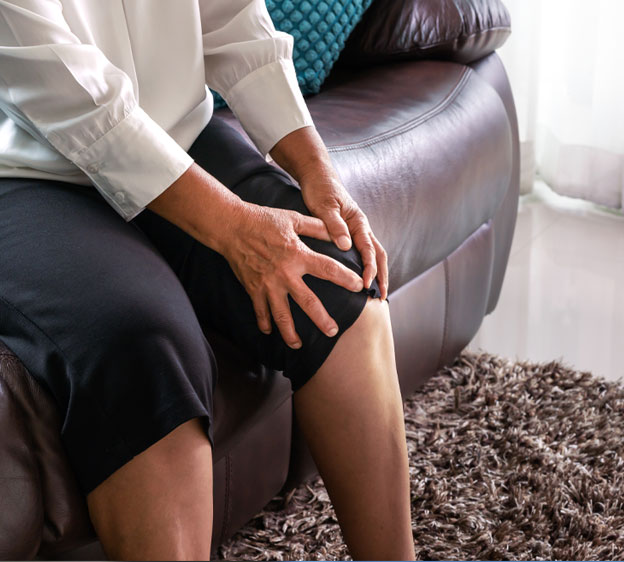
The knee is one if your body’s strongest joints, but that doesn’t make it immune to aches and pains. A variety of factors can contribute to knee pain, including osteoarthritis (wear and tear that occurs due to aging or overuse), being overweight or obese, or an old injury. When your knee isn’t feeling up to par, the effects on your life can be wide-ranging — you may find it more difficult to work, exercise, play with your children or grandchildren, or even move around your home.
Read More: Knees and Osteoarthritis
Wondering how to get relief from knee pain? There’s no one-size-fits-all approach. Knee pain occurs on a spectrum of severity. The choice of treatment depends on the intensity, frequency and duration of discomfort, as well as its effect on your quality of life. If you experience pain that doesn’t hamper your daily functioning in a major way, you may be able to find relief through home treatments and changing some of your daily habits. Let’s take a look at some potential remedies.
How to Reduce Knee Pain Without Medicines
Start with the simplest treatment — rest. Maybe all your knee needs is a break from activities that irritate it. Avoid overtaxing it for a few days and try elevating it.
“If your knee pain is due to an acute injury, ice may help,” says Dr. Vandit Sardana, a board-certified, fellowship-trained orthopedic surgeon at Beaufort Memorial Orthopaedic Specialists. “If it’s not an acute injury and you know or suspect the pain is caused by arthritis, it’s often better to try heat, which can help reduce inflammation. Arthritis is the wearing away of joint cartilage. That’s a mechanical problem, but the inflammation that results is what causes pain, stiffness and swelling.”
What you eat can also play a role in fighting inflammation. A healthy diet that includes:
- Plenty of fruits and vegetables
- Lean sources of protein, such as poultry
- Fish rich in omega-3 fatty acids, such as salmon
- Monounsaturated fats
- Whole grains, which help decrease inflammation.
Some studies have shown that individual foods, including turmeric, chia seeds and dark chocolate, may act as anti-inflammatory agents, but more data is needed for scientists to draw definitive conclusions. What’s clear is that some foods can fuel joint pain and inflammation.
“Sugar leads to inflammation, so it’s best to avoid processed sugar as much as possible,” Dr. Sardana says. “Natural sugar from fruit is better. Eating too many salty foods can cause swelling in the extremities, especially the legs. I advise people with knee pain to limit their sodium intake.”
Exercises for People With Knee Pain
Another non-medicinal strategy for reducing knee pain is exercise. Dr. Sardana compares a stiff, painful knee to a rusty hinge — once you start moving it, movement comes easier. Not all forms of activity, however, are beneficial for aching knees.
“High-impact activities, such as running, jar the cartilage in the knee, which could cause micro-trauma,” Dr. Sardana says. “Low-impact activities are much better. The best examples of this are walking, riding a bike and swimming. Good choices at the gym include using a stationary bike, treadmill or elliptical machine. Stretching, yoga and range-of-motion exercises strengthen the hamstring and quadriceps muscles, which support the knee.”
Want to strengthen your leg muscles while watching TV? Lie on your side on a yoga mat or beach towel with your head on a pillow. Straighten your top leg and lift it toward the ceiling so it forms a straight line with the rest of your body. Hold the position briefly before lowering your leg. Perform three sets of 10 repetitions with each leg.
When to Take Knee Pain Treatment to the Next Level
If non-medicinal treatments don’t provide sufficient relief, over-the-counter anti-inflammatory medications may help. Although available without a prescription, be sure to check with your medical provider before taking these. If pain persists, it may be time to see an orthopedic surgeon. He or she may prescribe more powerful anti-inflammatory medications or recommend cortisone injections or viscosupplementation, which is a series of injections of fluid to lubricate the knee.
Sometimes, conservative treatments simply aren’t enough to control knee pain, and total knee replacement may be the best option. Beaufort Memorial surgeons perform Mako Robotic-Arm Assisted Surgery for knee replacements. This technology allows the surgeon to use CT imaging to plan the surgery ahead of time and adjust this plan during the operation, which makes for a more precise procedure.
“Using Mako allows us to place the artificial components of the knee in a way that better suits each patient’s anatomy and ligament tendons,” Dr. Sardana says. “That can help the implant last longer, make the knee feel better and improve the patient’s function.”
Think you may benefit from Mako Robotic-Arm Assisted Surgery? Sign up for a Q&A about knee pain and get your questions answered by an expert.

